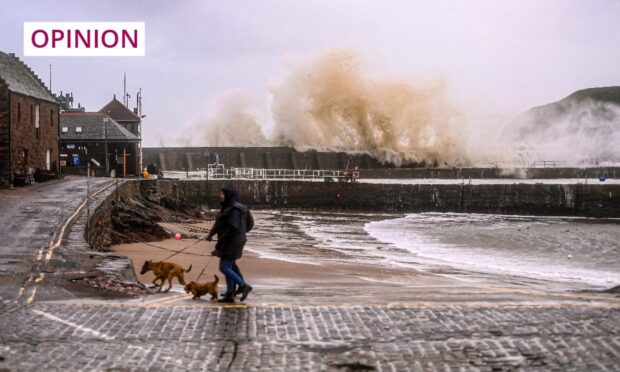Since Storm Arwen devastated communities across the north and north-east of Scotland in late November 2021, the people who live here have feared this moment: the arrival and wrath of Storm Babet.
Climate change means extreme winter weather events are part of our “new normal”; the first red alert warning issued by the Met Office only days ago was not a surprise, but it chilled residents in this part of the world to the core. And for good reason.
Within a short period, torrential rain led to dangerous levels of floodwater in some areas. Roads, including the A90, were closed due to fallen trees, flooding and up to 70mph winds. Many households and businesses lost power, some for extended periods.
 Public transport ground to a halt. Brechin’s River South Esk burst its banks and locals were evacuated from their homes.
Public transport ground to a halt. Brechin’s River South Esk burst its banks and locals were evacuated from their homes.
And, tragically, two people lost their lives: a 57-year-old woman who was swept into the Water of Lee in Angus, and a 56-year-old man whose vehicle was hit by a tree near Forfar. Our thoughts are with their families and friends, and we desperately hope no more injuries or fatalities come as a result of Storm Babet and its aftershocks.
As well as the extended red weather warning issued on Friday, serious amber and yellow alerts for wind and rain remain in place.
We will only know if prevention efforts were enough when dust settles
Even as storm conditions abate early in the coming week, the effects of Babet are likely to be long-lasting. Though nearly two years have passed since Storm Arwen, the destruction was unimaginable, and recovery is still ongoing. At that time, power to homes was eventually restored and fallen forests removed, but the trauma of what people and places were put through has stayed with these communities.
Lives were also taken during Arwen, including that of 35-year-old Aberdeenshire man David Lapage. Parts of the landscape remain scarred, with many trees lost and buildings damaged. In the aftermath, many voices (including The P&J’s) called for lessons to be learned and preventative action to be taken in good time against future extreme weather events.
From Covid to cost of living, several societal crises have developed or intensified since Arwen, but it is vital for leaders and decision-makers to acknowledge that storms are urgent emergencies which require undivided attention, planning and preparation.
Stonehaven’s multi-million-pound flood prevention scheme appears to have protected the town from the kind of disastrous flooding it experienced in 2012, but will other towns and villages have fared so well?
Sadly, we will only know for sure once the weather has changed and the dust has settled.
The Voice of the North is The Press & Journal’s editorial stance on what we think are the most important issues of the week



Conversation